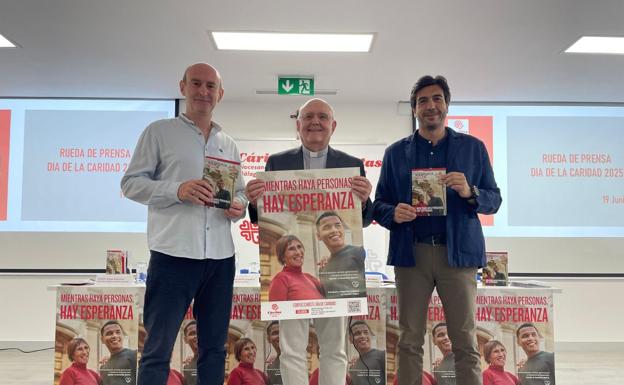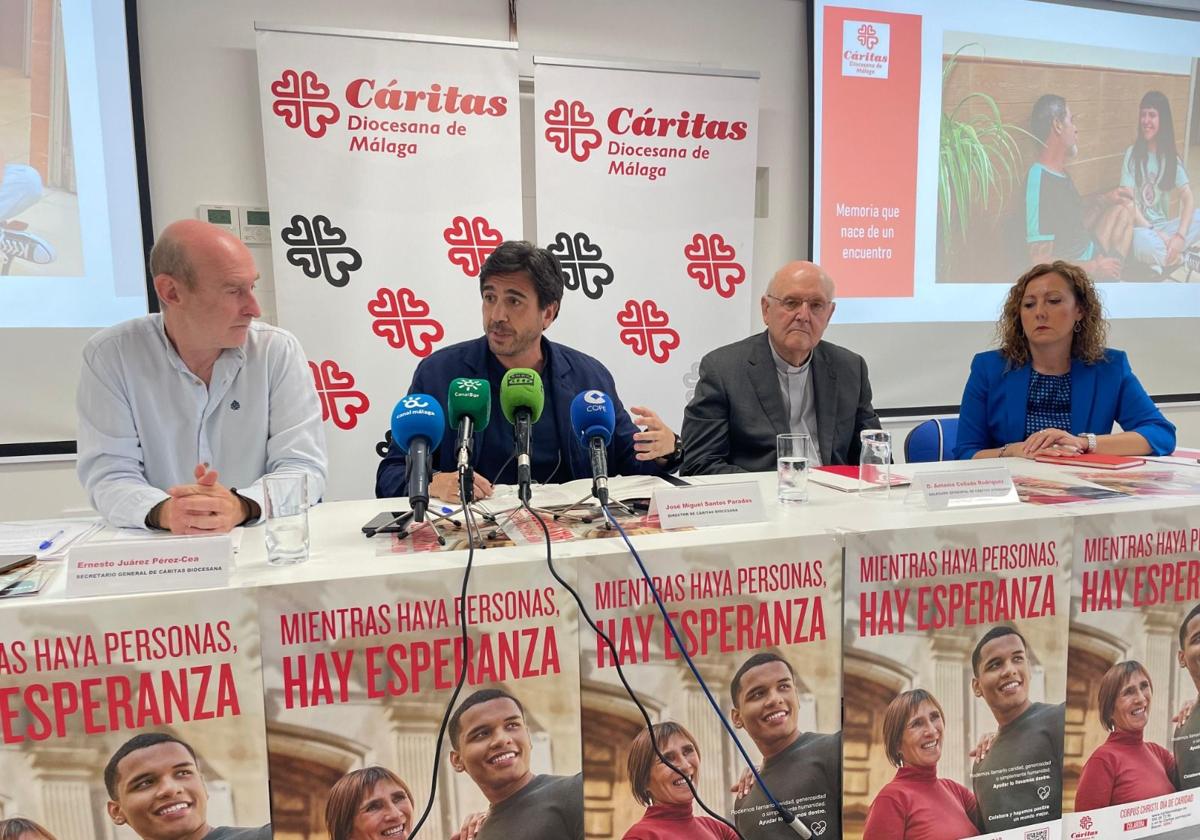One in four people assisted by Cáritas in Malaga province is employed
The organisation alarms that the housing crisis is a ' real and intense social crisis', leading to Cáritas having to increase its housing subsidies by 40%
"It is particularly worrying that 23% of the people we assist have income from regulated work activities. This confirms the increase in the number of working poor people, which was 15% last year. This means that one in four people who come to Cáritas have a regularised contract. They work in supermarkets, in construction, in many areas of the service sector and they need to come to Cáritas for support," said Ernesto Juárez, general secretary of the charity organisation in Malaga, announcing the data from the annual report for 2024.
The figures are even more striking when we take into consideration that they are released at a time of economic recovery and a general decrease in unemployment. Juárez also highlighted the precarious and vulnerable situation that women experience, as the gender gap is still prevalent and women have fewer work resources than men. Women are far more likely to be in temporary employment, part-time work and unstable positions.
According to Cáritas Diocesana de Málaga director José Miguel Santos, there are other two main factors that contribute to uncertain living conditions: the housing crisis and the irregular status of migrants. "Work is no longer a means of inclusion; there are people who are structurally unemployed or in a precarious situation, but there are also people who cannot make ends meet while working. In addition, there is a social housing crisis," he said, highlighting that both people in a state of poverty and many migrants are devoid of a path to inclusion.
44% of people assisted by Cáritas
have serious housing payment difficulties
Juárez said that 44% of the people assisted by Cáritas in 2024 have serious difficulties when it comes to paying for housing. "High prices mean that many people, even families, have to rent rooms in a shared flat. This can make it difficult to register at an address in the town hall, which gives access to rights, while also leading to overcrowding and loss of privacy. Families with children suffer other consequences as well, such as being unable to gain access to education and a sense of security," he said. The director highlighted that one in four people assisted by Cáritas lives in rented rooms, compared to only 17% in 2022 and 20% in 2023. In some cases, this could mean that four members of a family share just one room.
For this reason, Cáritas has been forced to increase particularly its housing subsidies. Over the past year, the organisation has provided 2,334 housing grants for a total amount of almost 870,000 euros, which is 38% higher than in 2023.
"There is a real social crisis, the housing crisis; it is a crisis of great intensity. It is a factor that unbalances the equation of expenses and family income," said Juárez.
The third area that prevents people from escaping exclusion targets a "particularly vulnerable group" - migrants. In 2024, Cáritas assisted almost 6,000 migrants, 65% of the total number of people who received help in the province. Those who find themselves in an irregular administrative situation don't have rights to aids and "have no support network" in the country.
17% of the people assisted by Cáritas are alone
In 2022 they accounted for 10% of the total
Juárez highlighted the high percentage of single people that Cáritas has been assisting, which has been increasing in recent years: in 2022, they represented 10% of the total; in 2023, 12%; and in 2024, 17%. "They are lonely people, not because they live alone, but because they have no network. There is a large migrant population, many single women... And a large part of this population is forced to live in rented accommodation, because they can't afford housing. This was not so common before. There are many people who are going through difficult situations and have a network; people who have no network come to Cáritas," said Juárez. Santos added: "There is a great social disengagement. The social fabric is breaking down. We now tackle many problems that used to be solved within the neighbourhood and the family."
'Do not delegate rights to the market'
This is why Cáritas is calling for the design of "rights-based public policies", demanding that "no human right is left in the hands of the market". "Delegating to the market will only generate new inequality gaps between those who can pay and those who cannot pay," said Juárez.
'People come here because they don't have their basic needs covered, even if the family has an income and a paycheck at the end of the month'

The presentation of the Cáritas 2024 report took place on 19 June, coinciding with the celebration of Corpus Christi and the presentation of the organisation's charity campaign. The slogan this year is: 'As long as there are people, there is hope'. Episcopal delegate of Cáritas Antonio Collado said: "People come here because their basic needs are not covered, even if the family has an income and a paycheck at the end of the month." He urged Catholics to not only receive communion in the Eucharist, but to also "touch the body of the suffering Christ through the poor", quoting Pope Francis. "What we have to do as Christians is denounce what is not going well: poverty continues to increase, even if it changes its face," he said. José Miguel Santos added: "Here, we come close to the problems that really matter to people. But these problems take second, third, fourth place; they are not at the centre of our concern. Here we do not talk about hoaxes or fake news, but about the pain, suffering and the reality that many people experience."
The average number of people served per team has fallen
There are three elements that make poverty and exclusion chronic: poor employment, unaffordable housing and difficulty of access to legal documents for migrants. Despite the grim statistics, Cáritas also took a moment to celebrate the organisation's achievements. In 2024, it assisted 9,088 people and took steps that benefited 20,374 people. This is a slight increase in the number of individuals assisted, attributed to the teams' efforts to improve the reception and care of more families. There has also been a slight but continuous decrease in the need for assistance since 2021, due to employment improvements and the introduction of rights such as the minimum living wage. If in 2020 - the year of the pandemic - each Cáritas team attended to an average of more than a hundred people, in 2024 the figure has fallen to an average of 75 people.
However, there is still some sombre data. Only 19% of the people assisted by Cáritas have managed to improve their situation; 31% have been coming for more than three years; and 39% came to Cáritas for the first time last year.
The economic resources invested by Cáritas last year in the province and in Melilla amounted to 9.25 million euros, 91% of which went to shelter and direct social care. As for the origin of the resources, almost four million came from members and donors, while the rest came from subsidies and agreements with public entities, as well as educational centres with the regional government of Andalucía.

